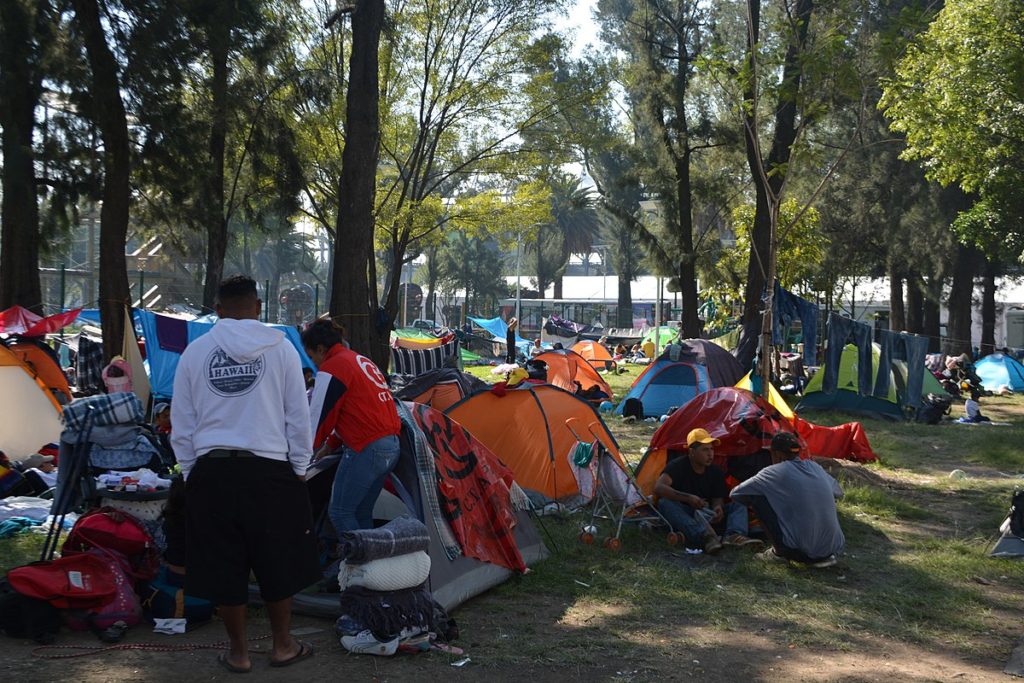
According to the US Department of Homeland Security (DHS), by last October, over 55,000 migrants seeking asylum and other forms of relief at the US-Mexico border had been returned to Mexico. As they await their immigration proceedings, which are often scheduled months into the future, migrants are frequently subjected to rape, torture, and kidnapping.
Such treatment is largely the result of the Migrant Protection Protocols (MPP), a policy implemented by the Trump Administration in 2019 that is now commonly referred to as the “Remain in Mexico” policy. Since its inception, the policy has been subject to widespread national and international criticism for placing migrants in grave danger and inhumane living conditions. Many also believe the policy to be in violation of domestic and international law.
In fact, MPP was deemed legally invalid in federal court on February 28, 2020, yet the court suspended its own decision later in the day. There is much uncertainty about whether the policy will continue and it seems that the Supreme Court will ultimately have the last word. Despite the controversy surrounding the Migrant Protection Protocols, DHS has continued to expand the policy to incorporate more ports of entry along the US border.
Even if the policy is overturned in the near future, its year-long run will have a lasting impact on the lives of tens of thousands of asylum seekers and set an unfavorable precedent for other countries’ immigration and asylum policies.
A Misguided Response to Migrants at the Border
The Migrant Protection Protocols were instituted in response to a new demographic of migrants reaching the US-Mexico border. Specifically, this new wave of migration has seen unprecedented rates of unaccompanied minors and families arrive from the Northern Triangle in Central America. The Northern Triangle consists of El Salvador, Honduras, and Guatemala and is considered to be one of the most dangerous areas in the world as it is plagued with gang violence, poverty, and corruption.
Women and children are particularly affected by this violence, with all three Northern Triangle countries listed among the top ten countries with the highest rates of child homicide and femicide. Despite these push factors, the Department of Homeland Security attributes this influx of migrants to “misguided court decisions and outdated laws” that allow migrants to take advantage of the US immigration system and remain in the US if they arrive as families or unaccompanied minors.
The DHS also cites an increase in fraudulent asylum claims as a reason for instituting MPP, but there is no evidence to support this. In response to this so-called “exploitation of our generous immigration laws,” the DHS has forced migrants to wait in Mexico for the duration of their immigration proceedings, subjecting them to a variety of dangers and legal challenges.
Due Process and ‘Non-Refoulement’ Principles Disregarded
The DHS states that in compliance with non-refoulement restrictions, migrants can only remain in the US if they can establish that they will more likely than not “be persecuted on account of race, religion, nationality, membership in a particular social group, or political opinion” if they are returned to Mexico. Mexican nationals, people with serious physical and mental health conditions, and other vulnerable populations should also be exempt from returning to Mexico under these principles. Yet, whether or not a migrant is returned to Mexico under MPP is left to the discretion of the asylum officer that is assigned to perform the detainee’s credible fear interview, which often takes place without any legal representation present.
According to Human Rights First, numerous instances of the DHS violating MPP policies and expatriating vulnerable populations such as LGBT+ identifying individuals and people with disabilities to Mexico have been documented. This pattern is cause for concern as migrant status alone is enough to put those returned to Mexico in danger of violence, sexual assault, and kidnapping. Moreover, under MPP, asylum seekers are sent to some of the most dangerous areas in Mexico, including cities designated at level 4 risk by the US State Department, the same threat level given to conflict-torn Syria. In these border cities, they are purposefully targeted by gangs and criminal organizations that aim to profit from their vulnerable position through extortion and kidnapping for ransom.
It is evident that migrants are targets of violent persecution in Mexico, but because of the DHS’s strict interpretation, or often negligence, of the non-refoulement principle, their fear is rarely deemed “credible” and they are forced to remain in Mexico. There, they may stay in overcrowded shelters or on the streets, depending on whether shelters or transportation is provided for them. Understandably, access to US-based lawyers in these areas is highly improbable.
However, many asylum seekers do not ever even receive notice of their court dates or cannot find transportation to the border to attend their hearings when they are notified. Others are prevented from attending because they are victims of kidnapping or violence. As a result, asylum seekers that fail to show up to court may be ordered removed in absentia. Clearly, MPP deprives asylum seekers of the right to due process by putting them in a disadvantaged position that makes it nearly impossible for them to prepare for, and sometimes even attend, their hearings.
Will Countries Follow Suit?: International Implications
The US’s harsh stance on immigration has had effects that extend far beyond the US-Mexico border. Under political pressure from the US government, the governments of Mexico and Central American countries are attempting to control and prevent the flow of asylum seekers as they travel North towards the US by setting up checkpoints along the route to the U.S. to apprehend migrants.
In fact, Mexico has already erected several detention centers near its southern border with conditions far more appalling than those of US detention centers. Detention centers like the Siglo XII center in Tapachula, Mexico have been criticized for their overcrowded and inhumane conditions, corruption, and violation of human rights. Guatemala, Honduras, and El Salvador have also entered into asylum cooperative agreements with the US. Under these bilateral agreements, Honduras, Guatemala, and El Salvador are deemed “safe third countries” by the US.
This means migrants passing through these countries must apply for asylum there before they apply for asylum in the US. If they fail to do so, the US can send asylum seekers back to apply for asylum in these nations. The Northern Triangle countries are most definitely not safe, as can be seen by the enormous flow of refugees fleeing them. Yet, as with the ‘Remain in Mexico’ policy, the asylum seekers are placed in Northern Triangle countries regardless of the dangers that follow.
The ‘Remain in Mexico’ policy and asylum cooperative agreements represent much more than a regional change in immigration policy; these policies represent an erosion of the entire principle of asylum, a pillar of international law as well as the post-WWII liberal international order. When a superpower undermines the rules of the international system, it does not go unnoticed; it sets a dangerous precedent for the rest of the world.
The views expressed by the author do not necessarily reflect those of the Glimpse from the Globe staff, editors or governors.







